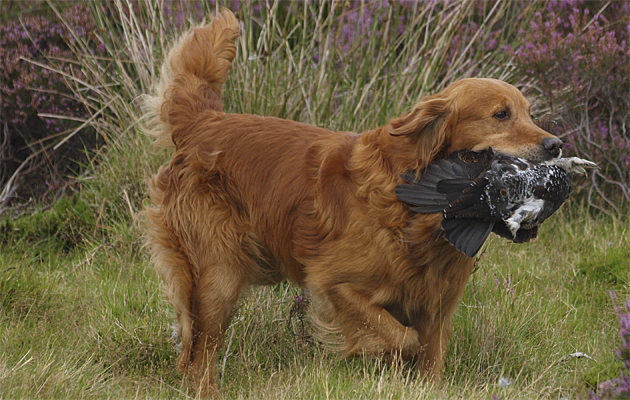With his friend's labrador and Land Rover getting on in years, David Tomlinson asks, why not replace both with a hybrid?
Retrievers don’t have to be labradors. The flatcoat was the Downton Abbey gundog and Edwardian gentleman’s favourite retriever. Every 10 years for the past four decades a friend has bought a new Land Rover Defender and a labrador puppy to go with it. They grow old together but while the Defenders have been traded in, the labradors have gone on to enjoy their retirement. Now, however, my pal finds himself at a crossroads. The Defender goes out of production this year, so he is unsure what to replace it with. He is also considering trying a different breed of retriever, perhaps a hybrid retriever, and asked what I’d suggest.
WHICH RETRIEVER IS BEST?
His shooting dog doubles as a family pet and is used mainly for picking-up. He trains his own dogs, while the family insists on a puppy, not a trained animal.
As he wants a retriever the choice is limited to five breeds:
- Chesapeake Bay retriever
- golden retriever
- flatcoated retriever
- curly coated retriever
- Nova Scotia duck-tolling retriever.
The Kennel Club classes the Irish water spaniel as a retriever for tests and trials but it’s really in a class of its own, so ruled out here.
I cannot see him considering a Nova Scotia duck-toller. These dogs have advantages in terms of compact size and attractive golden coat but good working examples are rare and it is a somewhat vocal breed. In contrast, the Chesapeake does have a certain appeal, as it’s big and tough, loves rough conditions and is difficult to keep out of water. It could even be argued that it’s the gundog equivalent of a Defender. Though it’s rare in the UK, most of the Chesapeakes that appear in the show ring are also worked, as the breed standard is still the perfect blueprint for a working dog.

Is the Chesapeake retriever at home in front of the Aga?
Chesapeakes make great wildfowling dogs but they have a reputation for being tricky to train; you ask them rather than tell them. Their oily, waterproof coats give them tremendous protection in freezing conditions and make them perfect kennel dogs. My friend’s dogs, however, are expected to bed down in front of the Aga, so a Chesapeake is probably not for him.
Nor is the curly coated retriever, the oldest of our native retrievers and by far the rarest. Good working examples are even less common than giant pandas.
That brings the choice down to just two breeds: golden and flatcoated retrievers. I have always been mystified as to why golden retrievers are so scarce in the shooting field – a good one can compete on equal terms with even the best of labradors. They are possibly the best looking of all the retrievers and working examples usually have the soundest of temperaments. Nor are they difficult to train.
One of the golden retriever’s great assets is its beautiful golden coat but show enthusiasts have been doing their best to make this the white retriever rather than the golden. Fortunately, all the working strains have retained the distinctive, deep-golden coat, although I have seen blond show dogs making a good job of picking-up. While they may be scarce, it’s not too difficult to track down a puppy from a working kennel. The downside is that they shed their coats continually and need a great deal more brushing than a labrador.
Golden retrievers share some blood with the flatcoat – at one stage they were registered as flatcoats and it wasn’t until 1911 that they were recognised by The Kennel Club as a separate breed. The flatcoat was the favourite dog of the Edwardian sporting gentleman. However, the labrador largely replaced it and today this native is scarce in the shooting field albeit popular in the show ring.
Flatcoat enthusiasts insist that there is no better breed for picking-up and I’ve no reason to disagree. Bold in cover, biddable and soft mouthed, their only real disadvantages are that they are more sensitive than labradors and reputedly slow to mature. However, anyone tempted by a flatcoat should do his homework carefully. This breed has been plagued by cancer, almost certainly due to a faulty gene that is in many, if not most, bloodlines.
A HYBRID RETRIEVER
I suspect my friend’s next 4×4 will be a hybrid with battery and petrol power. If he’s going to opt for a hybrid vehicle, why shouldn’t he also choose a hybrid dog? A flatcoat x labrador or a labrador x golden retriever would suit his needs perfectly, while such an outcross is more likely to remain fit and healthy than a purebred dog.





